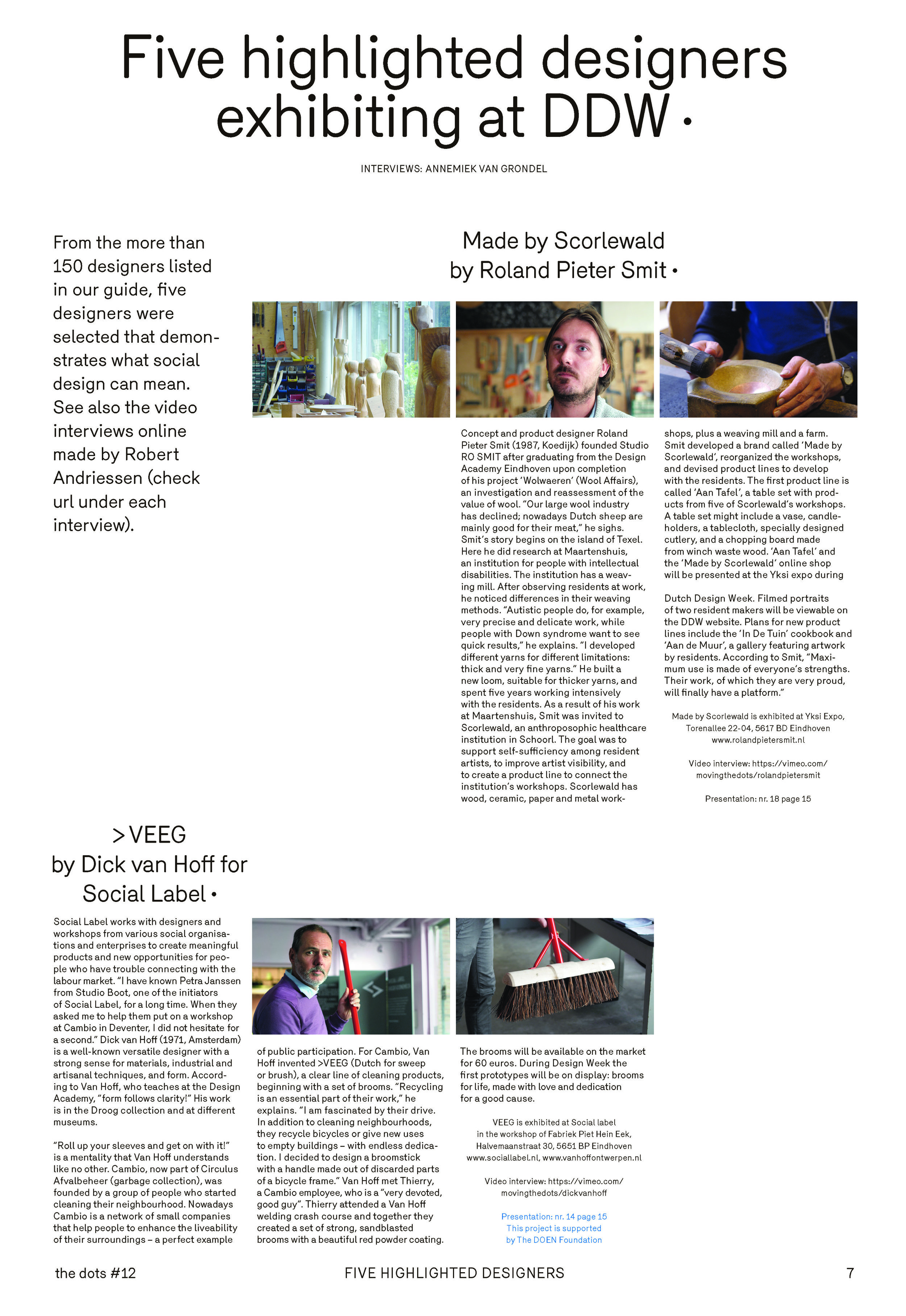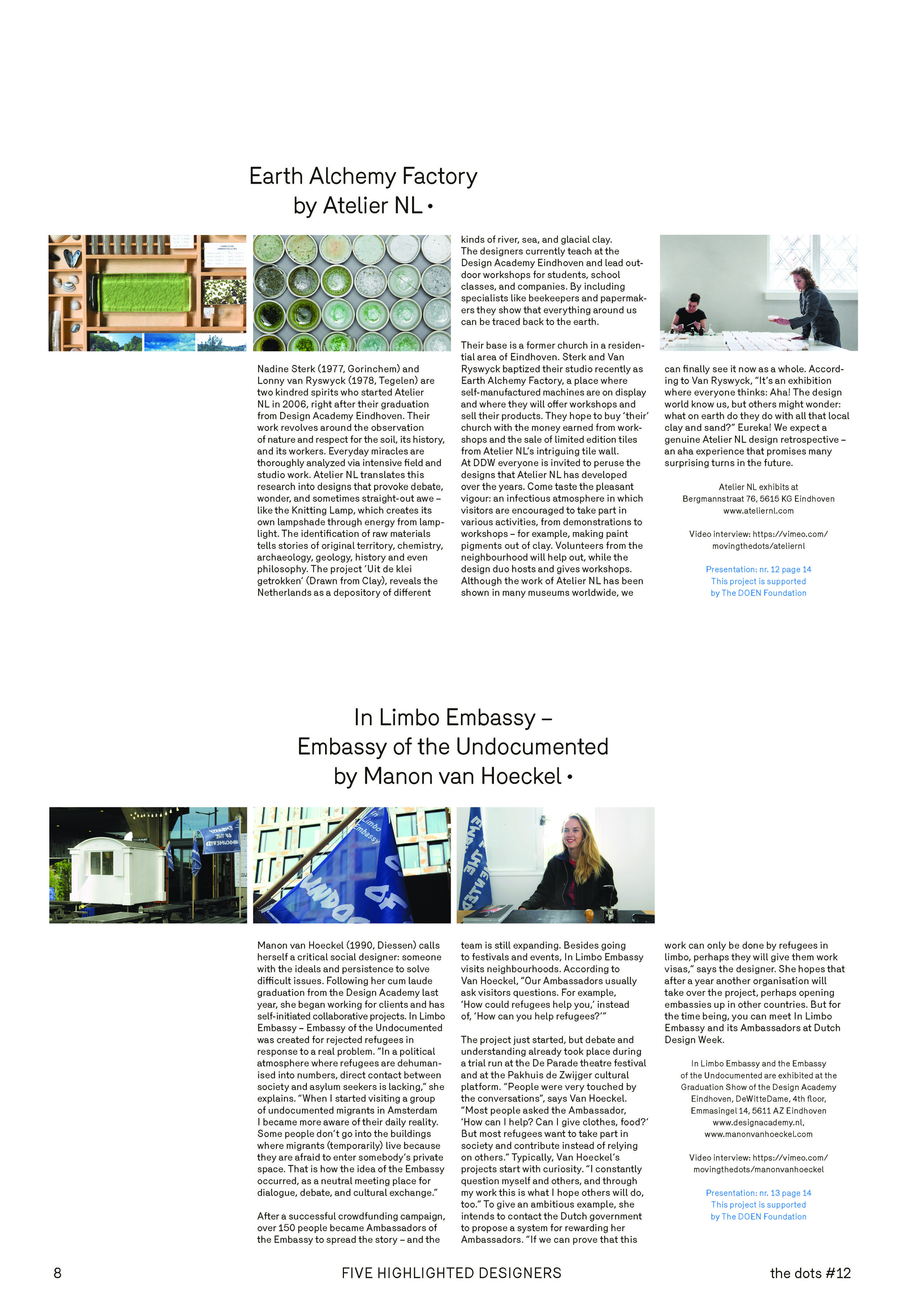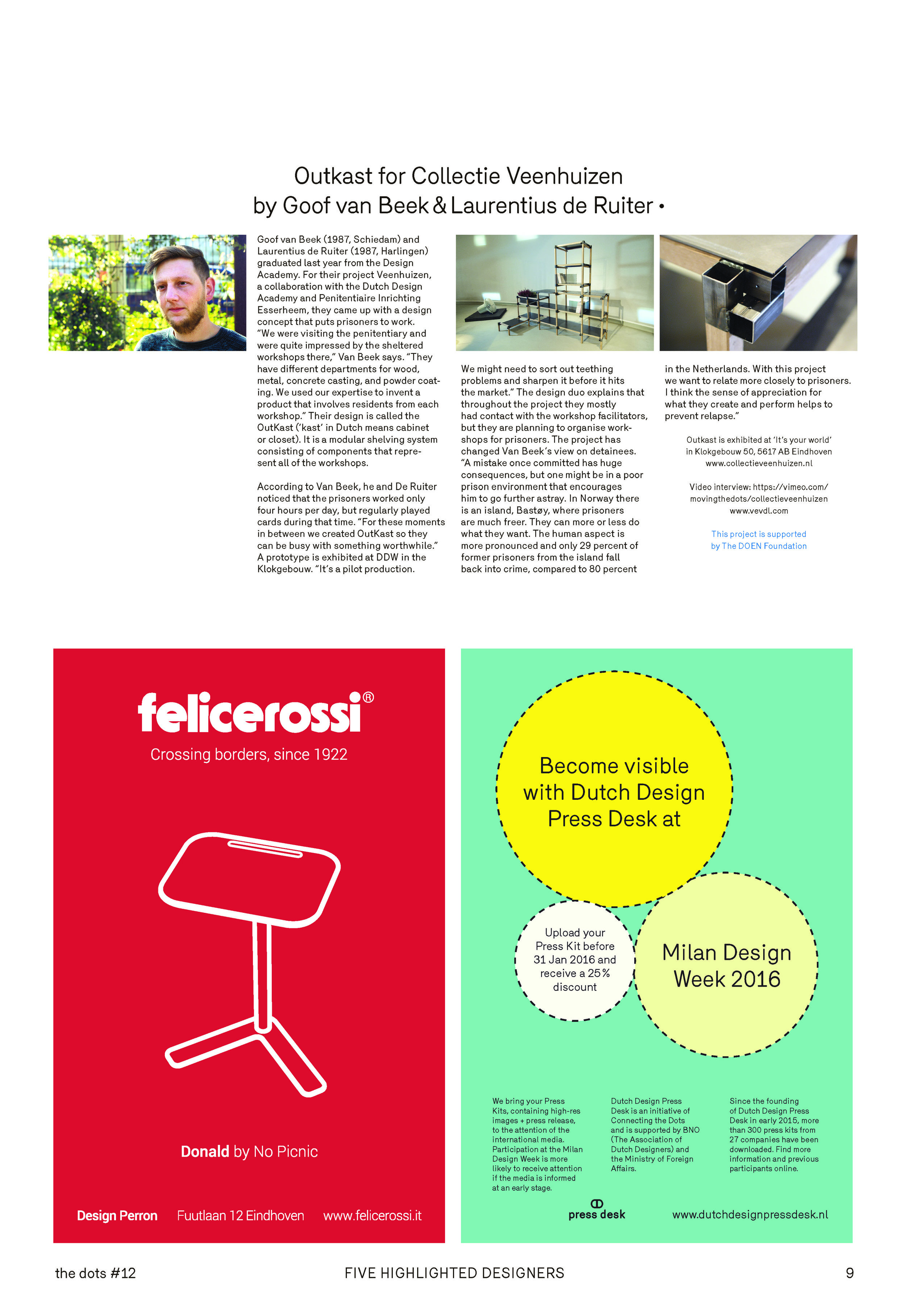connect the dots
Dutch Design Week: social and Green Design guide
Dutch journalist Annemiek van Grondel interviewed several Dutch designers for Dutch Design Week 2015 and wrote short descriptions of their background and work. The following articles were delivered to me in English for copyediting, as van Grondel's native language is Dutch. I was asked not to change the articles too much and we were on a tight deadline, so I polished them just enough to be up to par for publishing, while staying within short time constraints. Some of the supporting text on the following published pages was written by Dutch writers and thus was independent from my input as an editor. At the bottom of the page I've included pre- and post-copyedited texts for comparison.
pre- and post-copyedit comparisons:
‘Made by Scorlewald’ by Roland Pieter Smit
Original Version
Concept and product designer Roland Pieter Smit (1987, Koedijk) founded Studio RO SMIT after successfully graduating Design Academy Eindhoven with the project Wolwaeren (‘wool affairs’), an investigation and reassessment of the value of wool. ‘Our large wool industry has declined; nowadays Dutch sheep are mainly good for their meat’, he sighs. Time to turn the tables, to begin at the island of Texel. Here Smit did research at the Maartenshuis, an institution for people with intellectual disabilities. The institution has a weaving mill, and after doing an analysis of the people, he found differences in their method of weaving. ‘Autistic people do, for example, very precise and delicate work, while people with Down syndrome want to see quick results’, he explains. ‘I developed different yarns for different limitations: thick and very fine yarns.’ He also built a new loom, suitable for thicker yarns, and spent five years working intensively with the residents. In consequence Smit was asked for help by Scorlewald, an anthroposophic healthcare institution in Schoorl. Goal: generate a self-sufficient system and a better visibility of the residents and ensure a link between the various workshops. (Scorlewald has wood, ceramics, paper and metal workshops, plus a weaving mill and a farm.) Smit developed a brand: ‘Made by Scorlewald’, renewed the workshops and devised various product lines to work out with the residents. The first is called ‘Aan Tafel’. The concept consists of a set table with products from five different workshops, such as vases, candleholders, a tablecloth, specially designed tableware and a chopping board, made out of waste wood from winches. ‘Aan Tafel’ and the online Scorlewald shop will be presented in the Yksi expo during Dutch Design Week. Filmed portraits of two makers can be seen at the DDW site. Plans for new product lines are ‘In De Tuin’ (a cookbook) and ‘Aan de Muur’, a gallery with artwork of the residents. Smit: ‘Maximum use is made of everyone's strengths. And their work, of which they are very proud, will now get a podium.’
Copyedited version
Concept and product designer Roland Pieter Smit (1987, Koedijk) founded Studio RO SMIT after graduating from the Design Academy Eindhoven upon completion of his project ‘Wolwaeren’ (Wool Affairs), an investigation and reassessment of the value of wool. “Our large wool industry has declined; nowadays Dutch sheep are mainly good for their meat,” he sighs. Smit’s story begins on the island of Texel. Here he did research at Maartenshuis, an institution for people with intellectual disabilities. The institution has a weaving mill. After observing residents at work, he noticed differences in their weaving methods. “Autistic people do, for example, very precise and delicate work, while people with Down syndrome want to see quick results,” he explains. “I developed different yarns for different limitations: thick and very fine yarns.” He built a new loom, suitable for thicker yarns, and spent five years working intensively with the residents. As a result of his work at Maartenshuis, Smit was invited to Scorlewald, an anthroposophic healthcare institution in Schoorl. The goal was to support self-sufficiency among resident artists, to improve artist visibility, and to create a product line to connect the institution’s workshops. Scorlewald has wood, ceramic, paper and metal workshops, plus a weaving mill and a farm. Smit developed a brand called ‘Made by Scorlewald’, reorganized the workshops, and devised product lines to develop with the residents. The first product line is called ‘Aan Tafel’, a table set with products from five of Scorlewald’s workshops. A table set might include a vase, candleholders, a tablecloth, specially designed cutlery, and a chopping board made from winch waste wood. ‘Aan Tafel’ and the ‘Made by Scorlewald’ online shop will be presented at the Yksi expo during Dutch Design Week. Filmed portraits of two resident makers will be viewable on the DDW website. Plans for new product lines include the ‘In De Tuin’ cookbook and ‘Aan de Muur’, a gallery featuring artwork by residents. According to Smit, “Maximum use is made of everyone's strengths. Their work, of which they are very proud, will finally have a platform.”
VEEG by Dick van Hoff for Social Label
Original Version
Social Label works together with designers and workshops from various social organisations and enterprises to create meaningful products and new opportunities for people with, as they call it, a distance to the labor market. ‘I know Petra Janssen from Studio Boot, one of the initiators of Social Label, for a long time. When they asked me to help them putting up a workshop at Cambio in Deventer, I did not hesitate for a second.’ Dick van Hoff (1971, Amsterdam) is a well-known versatile designer with a strong feeling for materials, forms (‘Form follows clarity!’) and industrial and artisanal techniques. He teaches at Design Academy, and his work is included in the collection of Droog Design and different museums.
Roll up one’s sleeves and get on with it: a mentality Van Hoff understands like no other. Cambio, now part of Circulus Afvalbeheer (garbage collection), was founded by a group of people who started cleaning their neighbourhood. Nowadays Cambio is a network of small companies in which people work for enhancing the liveability of their surroundings. A perfect example of public participation. For them Van Hoff invented >VEEG (Dutch for sweep or brush), a clear line cleaning products, beginning with a set of brooms. ‘Recycling is a essential part of their work’, he explains. ‘I am fascinated by their drive. Apart from cleaning the neighbourhood, they recycle bicycles or give a temporary new meaning to empty buildings, with endless dedication. I decided to design a broomstick, with the handle made out of discarded parts of bicycle frame.’
He met Thierry, a Cambio employee, a ‘very devoted, good guy’. Thierry attended a special Van Hoff welding crash course and together they created a set of strong brooms, sandblasted and provided with a beautiful red powder coating. They will be put on the market for 60 euro. A broom for life, made with love and dedication for a good cause. At During Design Week the first prototypes are shown.
Copyedited Version
Social Label works with designers and workshops from various social organisations and enterprises to create meaningful products and new opportunities for people who have trouble connecting with the labor market. “I have known Petra Janssen from Studio Boot, one of the initiators of Social Label, for a long time. When they asked me to help them put on a workshop at Cambio in Deventer, I did not hesitate for a second.” Dick van Hoff (1971, Amsterdam) is a well-known versatile designer with a strong sense for materials, industrial and artisanal techniques, and form. According to Hoff, who teaches at the Design Academy, “form follows clarity!” His work is in the Droog collection and at different museums. “Roll up your sleeves and get on with it!” is a mentality that Van Hoff understands like no other. Cambio, now part of Circulus Afvalbeheer (garbage collection), was founded by a group of people who started cleaning their neighbourhood. Nowadays Cambio is a network of small companies that help people to enhance the liveability of their surroundings - a perfect example of public participation. For Cambio, Van Hoff invented >VEEG (Dutch for sweep or brush), a clear line of cleaning products, beginning with a set of brooms. “Recycling is an essential part of their work,” he explains. “I am fascinated by their drive. In addition to cleaning neighbourhoods, they recycle bicycles or give new uses to empty buildings - with endless dedication. I decided to design a broomstick with a handle made out of discarded parts of a bicycle frame.” Van Hoff met Thierry, a Cambio employee, who is a “very devoted, good guy”. Thierry attended a Van Hoff welding crash course and together they created a set of strong sandblasted brooms with a beautiful red powder coating. The brooms will be available on the market for 60 euros. During Design Week the first prototypes will be on display: brooms for life, made with love and dedication for a good cause.


